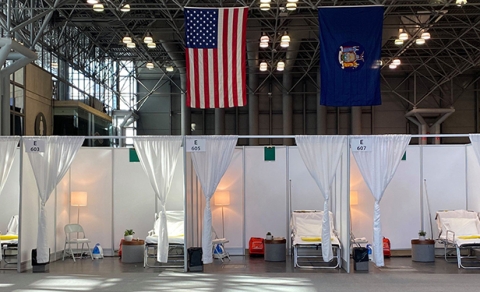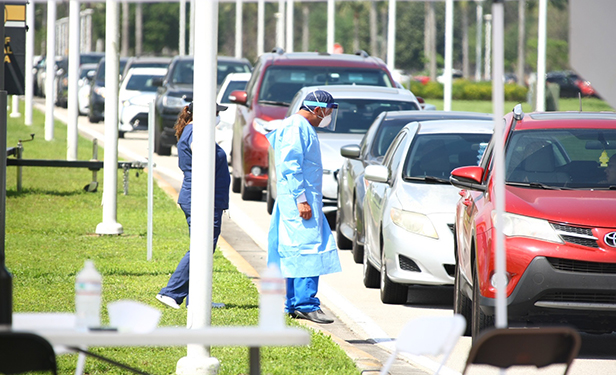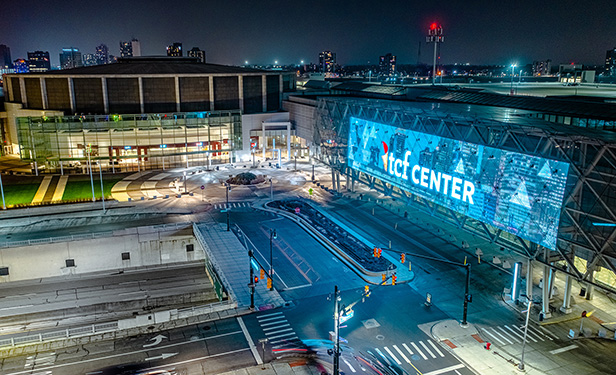Convention Centers Transform Into Hospitals in the Fight Against COVID-19

After closing their doors to trade shows and events due to the coronavirus pandemic, many convention centers across the U.S. are taking on an entirely different role. This week, many are being converted into makeshift medical facilities to help relieve beleaguered hospitals and staff so they can provide better care for more serious and critical patients. Take a look.
Javits Center
The Jacob K. Javits Center in New York City – currently the epicenter of the U.S. pandemic as of press time – is one of the first U.S. convention facilities to be converted into a temporary medical station. This effort is being led by the U.S. Army Corps of Engineers, National Guard, FEMA, New York State Department of Health, Javits Center staff and others, according to Javits officials.
At a press conference on March 22, Governor Andrew Cuomo outlined a plan for four 250-bed, 40,000-square-foot emergency hospital units at the convention center that would be capable of serving 1,000 people and be staffed by federal employees.
Just days later, construction on this first phase is now complete, and rooms with 1,000 beds have been installed in Hall 3E, along with a nurses’ station and a pharmacy. The Manhattan venue opened to receive its first non-COVID-19 patients on March 30 and will be constructing additional rooms on Level 3 in the coming days.
“Thanks to the dedication of our employees and support of partners at the federal, state and city levels of government, we were able to build the station in less than a week using contractor supervision and equipment,” said Alan Steel, Javits Center president and CEO.
Baltimore Convention Center
Less than a week after it became designated by Maryland Governor Larry Hogan as a Federal Medical Station on March 23, the Baltimore Convention Center, with the help of the Maryland National Guard, began transforming 123,000 sq. ft. of exhibit space into a medical station with 250 medical beds for patients recovering from COVID-19.
According to local news reports, this alternative care facility is expected to be open by April 24.
“When conditions necessitate and additional hospital beds are needed, the Baltimore Convention Center will host these alternative care units under the direction of the University of Maryland Medical Services and Johns Hopkins in partnership with state and local government including Mayor Young’s team,” explained Peggy Daidakis, executive director of the BCC.
Daidakis added that while the center will be receiving freight in the coming days to support alternative care operations, that does not mean those services are imminent.
“From this moment and until further notice, the facility is closed to the general public – we stand ready, when needed, in this effort,” she added.
Santa Clara Convention Center
A 250-bed medical shelter designed to provide short-term care for non-emergency patients is taking shape at the Santa Clara Convention Center in California. On March 27, the 146th airlift unit of the National Guard spent 12 hours setting up the makeshift hospital, which is designed for COVID-19-positive patients who need to stay quarantined but are well enough to leave the hospital. This could include people who are homeless or live in multi-person homes.
According to news reports, the convention center will include one side for women and one for men, anchored by a makeshift nursing station in the center. Volunteer doctors and nurses from across the state will run the hospital, however, an opening date for the facility has not yet been announced.
Orange County Convention Center

The Orange County Convention Center in Orlando is offering its off-site and remote parking locations for temporary drive-through COVID-19 testing. According to OCCC officials, this effort is being coordinated in partnership with the Orange County government, Florida National Guard, the Florida Division of Emergency Management and Florida Department of Health, and local law enforcement.
Planning efforts and logistical operations are also being supported by the OCCC’s transportation team, and both employees and partners alike have stepped up to assist at the center – from traffic coordination and sanitation measures to food donations and sustainability efforts.
“Orange County Mayor Jerry L. Demings’ guiding principles of innovation, collaboration and inclusiveness is a testament of our commitment to our community, and how we will work with state and local partners to get through this together,” said Mark Tester, executive director of the OCCC. “The OCCC is dedicated to flattening the curve, with a goal of coming back ahead of the curve and stronger than ever.”
McCormick Place
Chicago’s McCormick Place is being turned into a makeshift hospital to treat COVID-19 patients. According to the Army Corps of Engineers, the hospital will span all three halls of the convention center and include 3,000 beds, with patients separated by level of care. The temporary hospital is expected to be up and running by April 24, according to local news reports.
According to the U.S. Surgeon General, Chicago is among a number of U.S. cities identified as a “hot spot” for COVID-19 cases that can expect to see its numbers continue to rise.
Oregon Convention Center
On March 20, Portland’s Oregon Convention Center began providing shelter for up to 140 homeless community members. Managed by the Multnomah County Joint Office of Homeless Services and public health officials, this reservation-based emergency shelter offers 140 beds encompassing approximately 60,000 sq. ft. All available beds are assigned to individuals without COVID-19 symptoms by referral from an existing shelter provider.
The OCC has not held any trade shows or events since March 12, when Governor Kate Brown banned gatherings of 250 people.
“Portland was firmly established as a premier convention and visitor destination before this crisis that faces us today,” said OCC Director Craig Stroud in a statement. “We are fully confident that we can return our world-class level of service after the health crisis we face is over.”
Ernest N. Morial Convention Center
New Orleans Ernest N. Morial Convention Center officials are working with the Governor’s Office of Homeland Security and Emergency Preparedness and the Louisiana Dept. of Health to use the convention center as a “medical monitoring facility,” according to a March 27 statement.
The venue will be open to patients recovering from COVID-19 for up to 60 days as the city’s hospitals exceed capacity for patients needing acute care. Meanwhile, plans are already in place for the complete restoration and remediation of the facility prior to events resuming, according to EMCC officials.
TCF Center

Detroit’s TCF Center has been designated by Governor Gretchen Whitmer, the State of Michigan and FEMA as a temporary alternate care facility for COVID-19 patients, according to a March 29 statement from the Detroit Regional Convention Facility Authority and TCF Center.
Mobilization has already begun, and construction to adapt more than 250,000 sq. ft. into medical care space will be performed by TCF’s workforce and union labor. The conversion will include two separate floors that will be segregated based on the severity of illness, and when completed, will comprise approximately 900 beds and stations for medical personnel. Construction is expected to begin within the next few days.
“As we navigate this unprecedented time together, TCF Center is fully prepared to do its part in supporting our residents and community,” said Claude Molinari, general manager of TCF Center in a statement. “We stand in awe of the tireless and dedicated healthcare workers and first responders who are true heroes of our time.”
Atlantic City Convention Center
A temporary hospital will be set up at Atlantic City Convention Center to house South New Jersey residents battling COVID-19 infections, Governor Phil Murphy announced on March 25.
The 250-bed facility at the ACCC is part of a plan to establish temporary facilities in each of the state’s three regions, including at the Meadowlands Exposition Center in Secaucus, Hudson County; and the New Jersey Convention and Exposition Center in Edison, Middlesex County, according to news reports.
Together, the three facilities will have 1,000 beds. According to Murphy, the temporary hospitals should be up and running in “just a matter of days [or] weeks.”
San Diego Convention Center
The San Diego Convention Center is getting ready to open its doors to the city’s homeless residents in an effort to help prevent the spread of COVID-19. The plan is part of a community-wide coordinated approach announced on March 23 by regional leaders that includes opening parts of the San Diego Convention Center in phases to create more space to serve homeless individuals while allowing for adequate physical distancing within current shelter facilities.
As of press time, no further details or timeline for this effort have been finalized.
“In these extraordinary circumstances, we welcome the opportunity to add value to the community in a very different way by offering space for an emergency shelter,” said Clifford “Rip” Rippetoe, president and CEO of the SDCC. “We recognize the importance of supporting the most vulnerable among us, including those who are unsheltered, and we look forward to using this community asset to serve our neighbors in need.”
Don’t miss any event-related news: Sign up for our weekly e-newsletter HERE and engage with us on Twitter, Facebook, LinkedIn and Instagram!


Add new comment